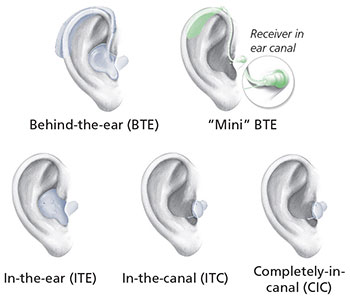
Approximately 15% of American adults (37.5 million) aged 18 and over report some trouble hearing.
Age is the strongest predictor of hearing loss among adults aged 20-69, with the greatest amount of hearing loss in the 60 to 69 age group.
About 2 percent of adults aged 45 to 54 have disabling hearing loss. The rate increases to 8.5 percent for adults aged 55 to 64. Nearly 25 percent of those aged 65 to 74 and 50 percent of those who are 75 and older have disabling hearing loss.
About 28.8 million U.S. adults could benefit from using hearing aids.
Among adults aged 70 and older with hearing loss who could benefit from hearing aids, fewer than one in three (30 percent) has ever used them. Even fewer adults aged 20 to 69 (approximately 16 percent) who could benefit from wearing hearing aids have ever used them.
You may suspect you have a hearing loss if you have a decreased sensitivity to sound, and can answer yes to all or most of these questions:
Do you have trouble understanding others’ speech, where their voices sound muffled or are difficult to understand?
Do you find that you are often asking others to speak more clearly or to repeat themselves?
Do you find that you are having more disagreements or misunderstandings with family members and friends?
Do you withdraw from conversations and avoid social situations?
Do you find the TV or radio volume is too low?
Hearing loss affecting adults is typically associated with aging, but can also be due to hereditary factors, noise exposure (occupational and recreational), viral and bacterial infections, heart conditions or stroke, head injuries, tumors, and certain medications.
If you suspect you have a hearing loss, you should seek professional advice as soon as possible, because some hearing problems can be quite serious as they may be due to other related illnesses or certain medications.
If your health plan requires a referral to see a specialist, contact your primary care provider (PCP) for your initial hearing assessment. Your PCP will refer you to either a Ear, Nose and Throat (ENT) doctor (also known as an otolaryngologist), or an audiologist or hearing aid specialist, depending on the severity of your needs.
An ENT doctor specializes in diagnosing and treating diseases of the ear, nose and throat. An audiologist has specialized training in identifying and measuring the type and degree of hearing loss and recommending treatment options. Some are also licensed to fit hearing aids. A hearing aid specialist is licensed by the state to conduct and evaluate basic hearing tests, offer counseling and fit and test hearing aids.
After you have a hearing test and it is recommended that you be fitted for hearing aids, there are three basic styles of hearing aids with five options available:
Styles of Hearing Aids
Behind-the-Ear (BTE)
Mini BTE (Receiver in Ear Canal)
In-the-Ear (ITE)
In-the-Canal (ITC)
Completely-in-Canal (CIC)

Your provider will work with you to ensure that you are fitted with hearing aids that best meet your needs and lifestyle.
Assistive Listening Devices
There are also several assistive listening devices (ALDs) available on the market to help patients with hearing loss. Read NIDCD’s fact sheet on ALDs to learn more.